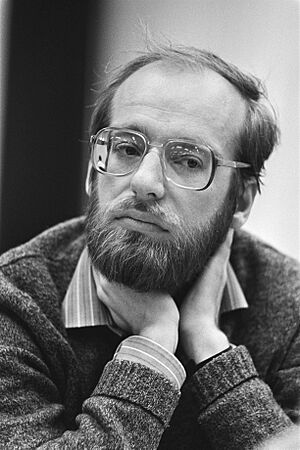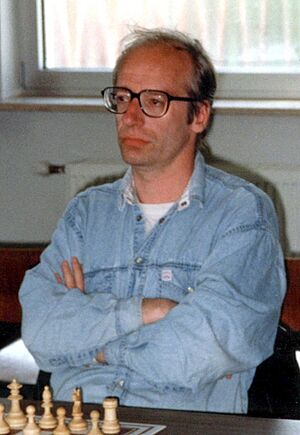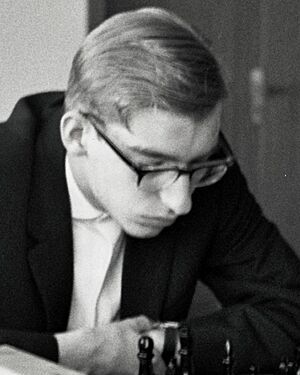Robert Hübner facts for kids
Quick facts for kids Robert Hübner |
|
|---|---|

Hübner in 1983
|
|
| Country | Germany |
| Born | 6 November 1948 Cologne, Germany |
| Died | 5 January 2025 (aged 76) Cologne, Germany |
| Title | Grandmaster (1971) |
| FIDE rating | 2574 (February 2026) |
| Peak rating | 2640 (July 1981) |
| Peak ranking | No. 3 (July 1981) |
Robert Hübner (6 November 1948 – 5 January 2025) was a German chess grandmaster and writer. He was also a papyrologist, someone who studies ancient writings on papyrus. Robert Hübner was one of the best chess players in the world during the 1970s and early 1980s.
Contents
Chess Career Highlights
Becoming a Grandmaster
Robert Hübner started showing his chess talent early. When he was 18, he was a joint winner of the West German Chess Championship. In 1965, he won the Niemeyer tournament for young European players under 20.
He earned the title of International Master (IM) in 1969. Just two years later, in 1971, he became a Grandmaster (GM). This is the highest title a chess player can achieve. By 1980, he was ranked third in the world by FIDE, the international chess organization.
World Championship Challenges
Between 1971 and 1991, Robert Hübner played in four Candidates Tournaments. These tournaments were important steps to decide who would challenge for the World Chess Championship.
In 1980–81, he had his best result. He won his quarter-final and semi-final matches. He reached the final match against Viktor Korchnoi. However, he stopped playing after 10 games when he was behind by one point.
In 1983, he played against Vasily Smyslov. Their match was tied even after extra games. To decide the winner, they used a unique method: a spin of a roulette wheel. Smyslov won the spin.
Top Tournament Victories
During his strongest years, Robert Hübner played in many elite chess tournaments. He was invited to the "Tournament of Stars" in Montreal in 1979. There, he played alongside other famous players like Anatoly Karpov.
He won several important tournaments. These included Houston in 1974 and Munich in 1979. He also won the Rio de Janeiro Interzonal in 1979. Other wins were in Chicago (1982), Biel (1984), Linares (1985), and Tilburg (1985).
In 2000, he helped the German team win a silver medal. This was at the 34th Chess Olympiad in Istanbul. Robert Hübner continued to play in international events into the 2000s. However, he was not a full-time chess player because of his academic work.
Playing Style
Robert Hübner's chess technique was known for being very effective. Chess experts described his style as strong and precise. One expert, Bill Hartston, said that Hübner's careful approach kept him from reaching the very top.
Other Contributions to Chess
Chess Writings and Analysis
Robert Hübner wrote many important works about chess. He studied the games of past world champions. He also analyzed brilliant chess moves from the 1800s. His detailed studies included games by famous players like Bobby Fischer and Alexander Alekhine.
A special opening move sequence in chess is named after him. It is called the Hübner Variation of the Nimzo-Indian Defence. This specific opening starts with the moves: 1.d4 Nf6 2.c4 e6 3.Nc3 Bb4 4.e3 c5 5.Bd3 Nc6 6.Nf3 Bxc3+.
Views on Doping Tests
When anti-doping tests were introduced in international chess, Robert Hübner decided not to play for the German national team. He believed these tests were unnecessary. In his opinion, doping cannot truly improve a chess player's skill. He felt that it only affects how they apply their abilities. He once said, "I am always happy if my opponent's abilities can fully unfold, because then I learn more."
Xiangqi Skills
Besides regular chess, Robert Hübner was also known for his skill in xiangqi. This is a type of Chinese chess. He was considered one of the best xiangqi players outside of China.
Personal Life
Robert Hübner was born in Cologne, Germany, on 6 November 1948. He passed away in a hospital in Cologne on 5 January 2025, at the age of 76. He had been diagnosed with stomach cancer two years before his death. Robert Hübner was also known for being able to speak many different languages, reportedly a dozen.
Notable Games
- Robert James Fischer vs. Robert Hübner, Palma de Mallorca iz 1970, Caro-Kann defense: King’s Indian attack, ½–½ This was a dramatic game with attacks in the center of the board against the famous Grandmaster Robert James Fischer.
- Robert Hübner vs. Raymond Keene, Vienna (Austria) 1972, Modern Defense: King Pawn Fianchetto (B06), 1–0 After many careful moves, White's pressure on Black's king became very strong, leading to a winning combination.
See also
 In Spanish: Robert Hübner para niños
In Spanish: Robert Hübner para niños
 | Selma Burke |
 | Pauline Powell Burns |
 | Frederick J. Brown |
 | Robert Blackburn |



